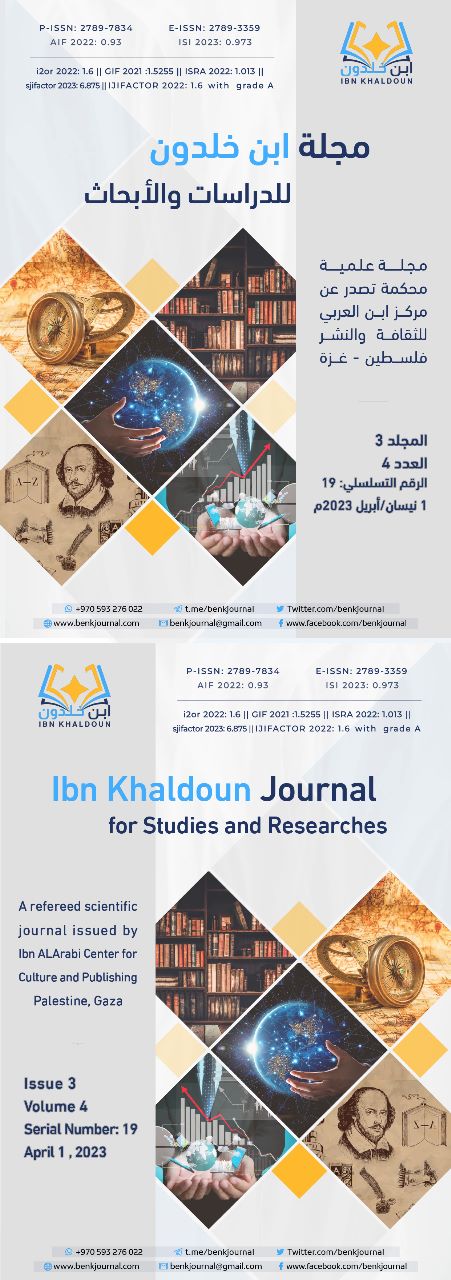The Role of Muslim Scientists in developing the Intellectual Movement During the Ilkhanate Era
Main Article Content
Abstract
The period after the fall of Baghdad at the hands of the Mongols (after 656 AH) is considered one of the important and critical periods in Islamic history. This period was not one of the dark periods as described by some historians, as some describe it as a period of stagnation and decline, what have been seen in the details of this matter, it is different. Despite the difficulty of this period of time, and the political chaos it went through, there are intellectual and literary activities, as scholars played their role in performing their scientific tasks in the Ilkhanate era. As a result, it was a significant development in the scientific movement in Iraq and the Islamic East, in addition to the role of scholars in the development of intellectual life and the emergence of a number of schools related to this matter. The study reached a set of results, the most prominent of which is that there was a great role for the scholars of Hilla in the development of the intellectual movement through the scientific delegations that met with Hulagu to protect their city, including Sadid Al-Din Al-Hali, Ibn Idris Al-Hali, Ibn Nama, and the pride of the investigators Hassan ben Yusuf ben Ali ben Al-Mutahhar Al-Asadi. Also, when Nasir Al-Din Al-Tusi accompanied Hulagu during the invasion of Baghdad, Al-Tusi collected four hundred thousand volumes in Baghdad.
Metrics
Article Details

This work is licensed under a Creative Commons Attribution-NonCommercial 4.0 International License.
References
القرآن الكريم.
ابن الطقطقي، محمد: الفخري في الآداب السلطانية، بيروت، دار صادر.
ابن العبري، واخرون (1994): تاريخ مختصر الدول، تحقيق: أنطوان اليسوعي، ط2، بيروت، دار الرائد.
ابن الفوطي، كمال الدين (1987): تلخيص مجمع الآداب، تحقيق: محمد بن منعم، بيروت، دار أحكام للعلوم.
ابن الفوطي، كمال الدين: حوادث الحوادث الجامعة والتجارب النافعة لأعيان المائة السابعة، ط1، بيروت.
ابن كثير، عماد الدين (1988): البداية والنهاية، تحقيق: علي شيري، دار إحياء التراث العربي بيروت.
الأمين محسن: أعيان الشيعة، تحقيق: حسن الأمين، دار المعارف للمطبوعات، بيروت.
جواد، مصطفى (1965): تلخيص مجمع الآداب في معجم الألقاب، وزارة الثقافة، دمشق.
الحلي، الحسن بن يوسف (1999): كشف المراد في شرح تجريد الاعتقاد، مقدمة النشرة الإسلامية، النجف الأشرف.
الحموي، ياقوت بن عبد الله (1995): معجم البلدان، دار صادر، بيروت.
خليفة، مصطفى حاجي (1999): كشف الظنون عن أسامي الكتب والفنون، ط1، بيروت، دار الفكر.
الخونساري، محمد (1992): روضات الجنات في أحوال العلماء والسادات، ط1، بيروت، دار إحياء التراث العربي.
الذهبي، محمد بن أحمد: دول الإسلام، ط1، مطبعة دار الكتب العلمية.
السبحاني، جعفر إشراقة (1998): وسوعة طبقات الفقهاء، ط1، مطبعة اعتماد كوم.
الشبيبي، كامل مصطفى: الفكر الشيعي والنزعات الصوفية، دار المعارف، بيروت.
الصفدي، صلاح الدين (2000ـ): الوافي بالوفيات، تحقيق: أحمد الأرناؤوط، بيروت، دار إحياء التراث العربي.
الطهراني، أقا بزرك (1982): الذريعة، ط3، دار الأضواء، بيروت.
القلقشندي، أحمد بن علي: صبحي الأعشى في صناعة الإنشاء، تحقيق: محمد حسين شمس الدين، بيروت، دار الكتب العلمية.
القمي، عباس: الكنى والألقاب، طهران، مكتبة الصدر.
الكتبي، محمد بن شاكر: الوافي بالوفيات، تحقيق: أمان عباس، دار صادر، بيروت.
كحالة، عمر: معجم المؤلفين، مكتبة المثنى، بيروت، دار إحياء التراث العربي.
اللجنة العليا في مؤسسة الإمام الصادق (1998): موسوعة طبقات الفقهاء، تحقيق: جعفر السبحاني، ط1، مطبعة اعتماد.





